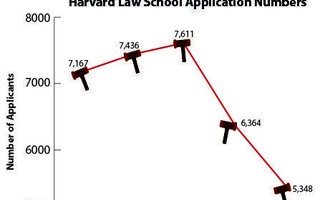Whether they are working in the library, in cafes, or even with mops in strangers’ bathrooms, more than 65 percent of Harvard undergraduates are student employees—balancing academics, extracurriculars, and the additional responsibility of term-time employment.
Student-employment is a diverse and rich experience that, despite its challenges, offers both a paycheck and life skills. With positions ranging from a part-time bathroom custodian to the president of a multimillion-dollar company, student employees take away much more from their job than an estimated average pay of $11.50 an hour. Many students said that the experience in the workplace provides a crucial connection between the classroom and the real world, preparing them for life after college.
GETTING PAID
It may come as no surprise that most student-employees are primarily concerned with cold, hard cash. Office of Career Services Director Robin Mount said that most Harvard students who work during the academic year do so to earn money. Still, in recent years the increase in Harvard financial aid has led to a shift in the specific financial reasons students continue to sign up for work.
Harvard Student Agencies President Patrick S. Coats ’14 noted that many HSA student employees are using their paychecks differently than they did in the past.
“HSA was paying tuition 20 years ago,” he said. Today, many students use their paychecks for personal spending money.
Meg B. Swift ’93, the director of stu- dent employment, sees this as a positive trend.
“We’d love it if your job during term time pays for your trip to Pinocchio’s rather than billed expenses”, Swift said.
According to Swift, upperclassmen who receive financial aid are expected to contribute around $3,500 per year towards their billed expenses, which include tuition, books, and travel expenses. James R. M. Watkins ’16, for instance, said he has his job at the Lamont circulation desk as part of his financial aid plan but his paycheck is for “snacks and weekend spending money.”
Student employment can be a good way to keep the mini-fridge stocked. The limits for the Federal Work Study Program are $9.50-12.50 an hour, with some other jobs—both on and off-campus—paying even more, Swift said.
“On-campus jobs pay really well compared to jobs I’ve had in the past,” said Claire B. Fitzgerald ’14, an employee at Lamont Café.
OUTSIDE BENEFITS
While money is often cited as the reason for having term-time employment, student employees said that there are many other benefits. These range from learning responsibility to building self-esteem, Coats said.
“Managing work on top of school is definitely a useful thing to know how to do,” Fitzgerald said.
In fact, employers highly value these skills in the workforce, according to Mount.
Read more in News
Faculty Members Say Grade Distribution is Not a Big ConcernRecommended Articles
-
The Fed Must ActThe Federal Reserve is failing to fulfill its mandate to pursue the goals of price stability and maximum employment.
-
Prospects Improve for HLS GraduatesAfter a dip in hiring rates amid the financial crisis, Harvard Law School graduates’ employment prospects are steadily improving.
-
HLS Moves Up RecruitingHarvard Law School altered the 2011 schedule for their annual Early Interview Program, moving on-campus recruiting to mid-August and allowing second years to finish the entire interview process before the beginning of classes.
-
Harvard, Help us WorkSmall things have made Harvard feel just as much of a home to me as my native Costa Rica. But when it comes to getting a job, international students at Harvard have a rough time—one that could be alleviated by proper action on behalf of the university.
-
The Harvard Works Progress AdministrationHarvard can and should be able to lay off employees when it has a legitimate reason to do so. Harvard is a private institution, and the number of employees it chooses to have is a matter of neither public policy nor popular consensus.
-
 HLS Application Numbers Defy National Trend for This Cycle
HLS Application Numbers Defy National Trend for This Cycle














